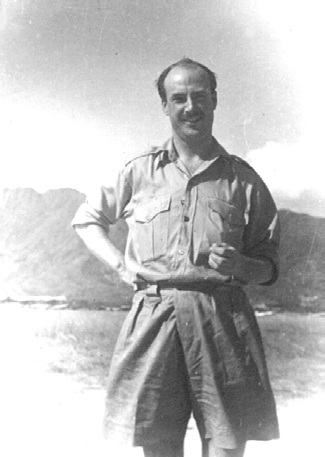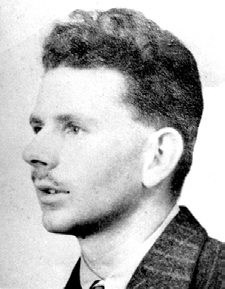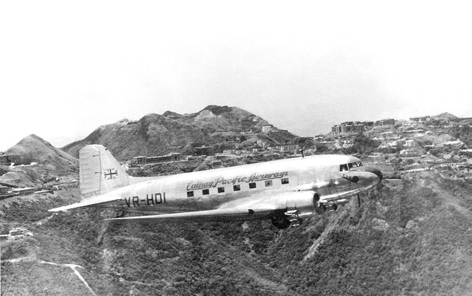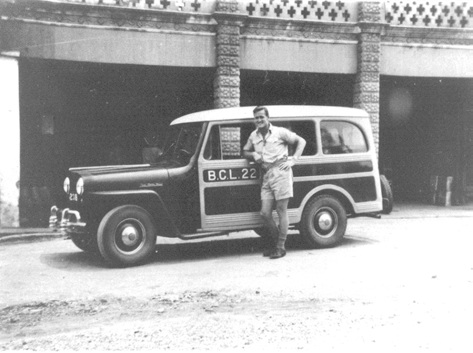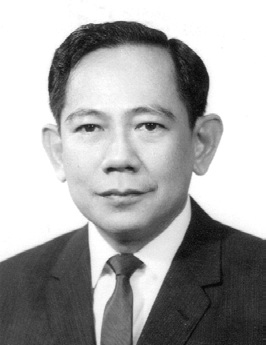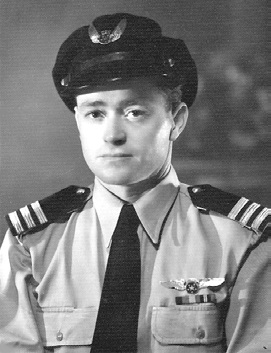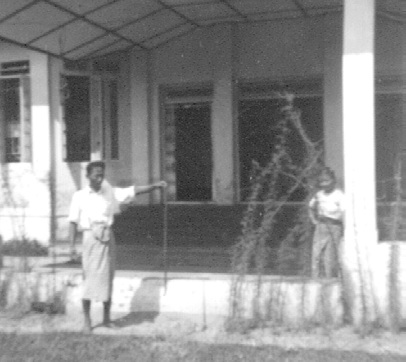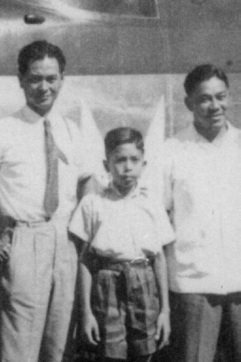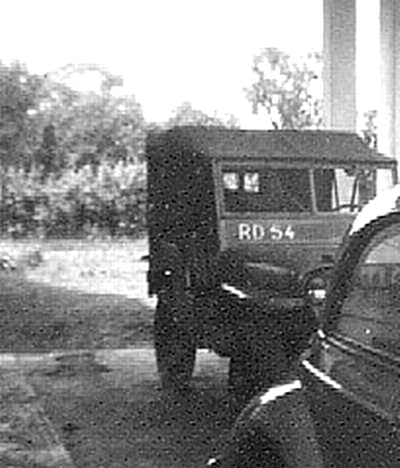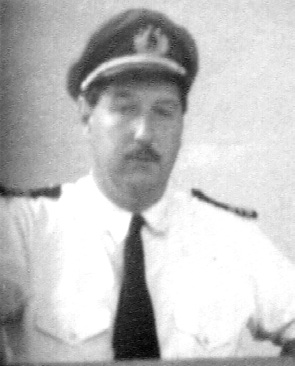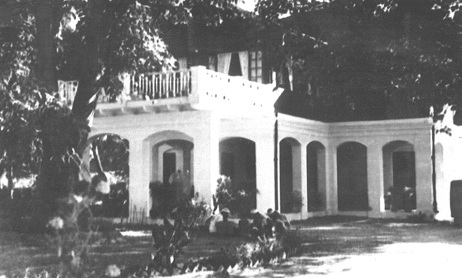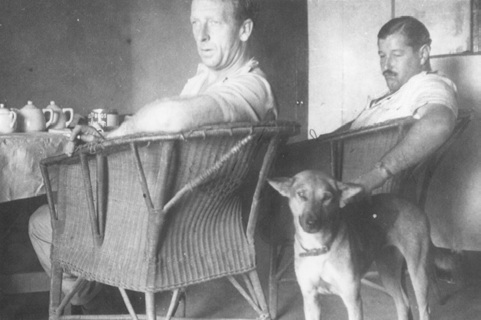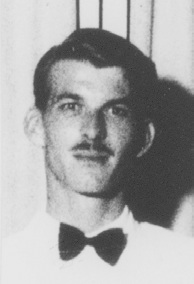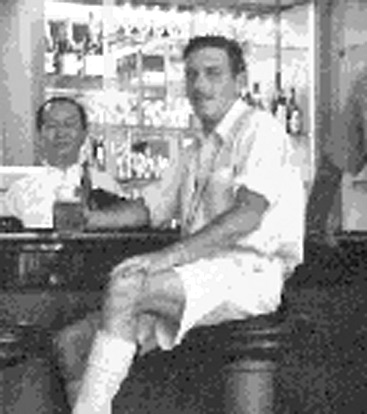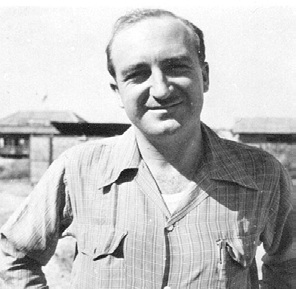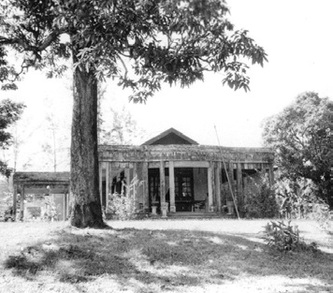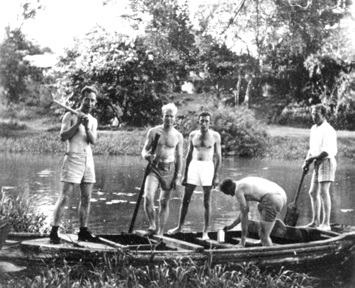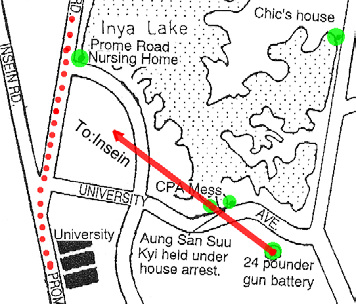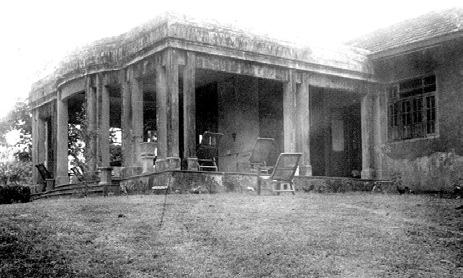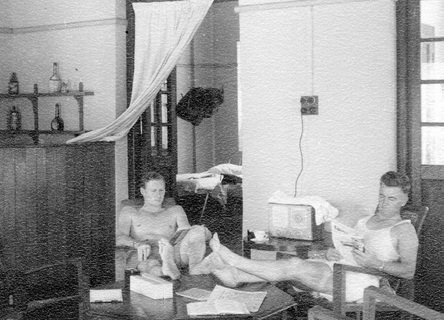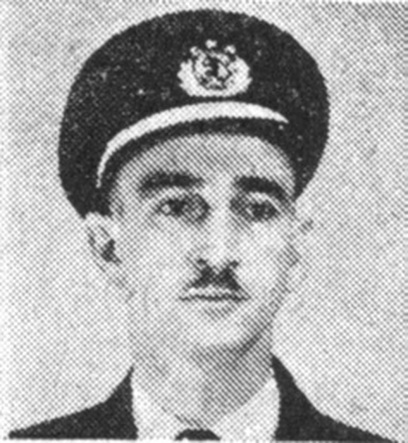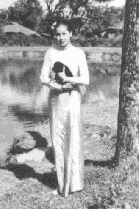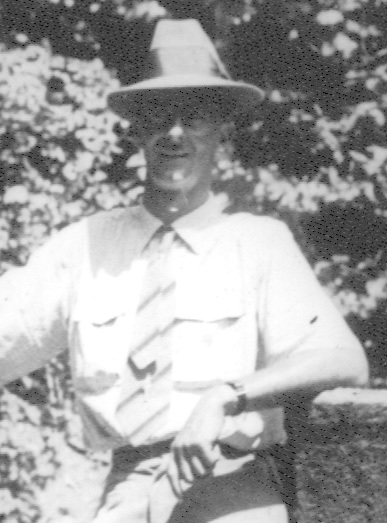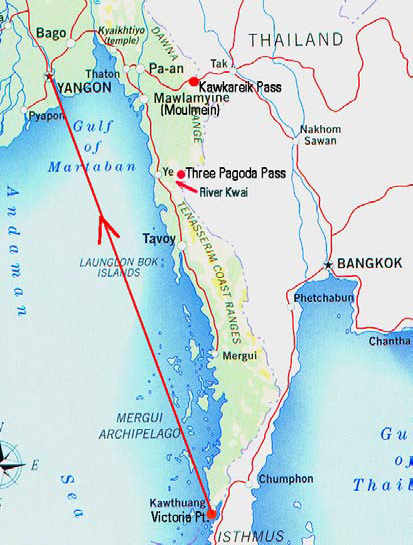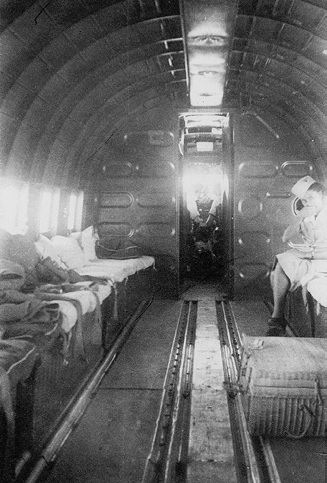Burma - Short Stories
How it Started
There were three salient points that helped establish the early Cathay Pacific. These were the lucrative gold charters, the Butterfield and Swire management and the insurgency in Burma.
The Burma adventure began in early November 1947 when Capt. A.R. Lewis landed his DC-3 on the perforated steel plates (PSP) of Mingaladon, the airfield of Rangoon. These interlocking plates were widely used in the East and the Pacific campaigns and constituted one of the most successful inventions of the war. Each interlocking strip was about eight feet in length and two feet wide, and they could transform a muddy paddy field into a useable runway in a matter of minutes. They are still to be seen in the form of fencing and rough construction throughout these parts of the world today. The 29 November found the company's other DC-3 making that distinctive whining sound as the wheels touched down with Captain Neville Hemsworth in command.
Those initial flights were of short duration with a night stop over at Rangoon. Later, the brutal insurgency that exploded on this backward country brought tours that extended for several weeks. When the insurgents strangled the three R’s, railway, roads and rivers, Cathay Pacific assisted the government of Thakin Nu to supply his beleaguered country.
These insurgents were the Karens of the hill country to the east and north, and were the traditional enemies of the Burmans who made up the other main element of the country’s population. Both Karens and Burmans are collectively called Burmese.
The Burma adventure began in early November 1947 when Capt. A.R. Lewis landed his DC-3 on the perforated steel plates (PSP) of Mingaladon, the airfield of Rangoon. These interlocking plates were widely used in the East and the Pacific campaigns and constituted one of the most successful inventions of the war. Each interlocking strip was about eight feet in length and two feet wide, and they could transform a muddy paddy field into a useable runway in a matter of minutes. They are still to be seen in the form of fencing and rough construction throughout these parts of the world today. The 29 November found the company's other DC-3 making that distinctive whining sound as the wheels touched down with Captain Neville Hemsworth in command.
Those initial flights were of short duration with a night stop over at Rangoon. Later, the brutal insurgency that exploded on this backward country brought tours that extended for several weeks. When the insurgents strangled the three R’s, railway, roads and rivers, Cathay Pacific assisted the government of Thakin Nu to supply his beleaguered country.
These insurgents were the Karens of the hill country to the east and north, and were the traditional enemies of the Burmans who made up the other main element of the country’s population. Both Karens and Burmans are collectively called Burmese.
My first Burma tour began on 3 May 1948, when I was assigned as Captain John Furley’s first officer, and terminated after the expected three weeks or so. Tour followed tour, and each deepened my affection for the country. At one time I had serious thoughts of becoming a citizen of Burma, as did a dear friend, Lance Rutherford. For a while it seemed a wonderful idea, yet with the passing of time so did the urge.
My duties were pleasant and I enjoyed every facet of life. Romantic names like Tavoy, Akyab, Heho, Kyaukpyu, Bassein, Moulmein, Anisakan, Pagan and Mandalay rolled off my tongue with ease. To the casual observer this familiarity might have been mistaken for a lifetime of association not merely days. Most sectors were short, and although we got an early start it was unusual to work after 1600 hours. Each flight was crammed with interesting things, and the short Irrawaddy Delta flights proved some of the most exciting. A prime memory is the thousands of passengers that we shepherded into the sky for the very first time.
My duties were pleasant and I enjoyed every facet of life. Romantic names like Tavoy, Akyab, Heho, Kyaukpyu, Bassein, Moulmein, Anisakan, Pagan and Mandalay rolled off my tongue with ease. To the casual observer this familiarity might have been mistaken for a lifetime of association not merely days. Most sectors were short, and although we got an early start it was unusual to work after 1600 hours. Each flight was crammed with interesting things, and the short Irrawaddy Delta flights proved some of the most exciting. A prime memory is the thousands of passengers that we shepherded into the sky for the very first time.
Riding Shotgun
I shared several memorable experiences with Captain John Paish. The morning of 26 January 1949 dawned with a warning to shepherds – a blood-red skyline. Metrologists scoff at that old wives tale but later a furious storm lashed Mingaladon Airfield that closed it for the rest of the day!
We were to ferry VR-HDI to Kai Tak for her periodic maintenance check. Prior to our departure many of her serviceable components were cannibalised as spares for the rest of the fleet. This left us with minimum blind flying instrumentation. Our radio officer was Dick Labrum with Eric Aylward the ground-cum-flight spanner. I thought it a good crew – argumentative - but a good crew!
Our crew transport, an ex-army Dodge called a battlewagon, waited under the Mess porch. As the Karen rebellion had gained momentum the Military found it prudent to provide us with an escort to and from Mingaladon. This escort consisted of three soldiers in a jeep with a swivel machine gun mounted in the rear. The jeep was sparkling clean but needed tuning. Our Indian driver, obviously a descendent of Sir Malcolm Campbell, had a theory. Why tempt Providence by ambling? Why not drive that exposed road at the greatest speed
possible! Joyously having discovered the secret of survival he would scream out of the drive and reach 100 mph within seconds. There would be no slowing until he reached the airfield. To him the presence of an escort seemed an unnecessary impediment, and this he
proved by outstripping our protection.
That morning I had been the last to arrive and my cunning companions had annexed the back seats, which left me riding shotgun. In a screech of burnt rubber we were away. The oversized Union Jack strapped to our rear bumper, streamed in our slipstream and within a
few heartbeats we were alone on the deserted Prome Road. At a tight bend our driver lost control, the wagon skidded to the left, and in a split second we were deep in a rubber plantation.
In terror the driver disappeared under the dashboard with his foot still jammed down on the accelerator. As the trees rushed by, I tried to join the driver, but he screeched something in Hindi that I took for piss-off there’s no more space here! With little else to do I grabbed the bucking steering wheel and more by luck than good management kept the vehicle upright. My only intention was to steady myself, but trees seemed to loom ahead and then with gracious civility move away from the careening juggernaut. Then, with no apparent help from me the vehicle managed to find its way back onto Prome Road.
As the driver sheepishly took over there was a blinding explosion fifty yards after the point where our vehicle had decided to detour. Our escort disintegrated in a tangle of gore and body parts. They had hit a Karen landmine planted to take out the lead vehicle.
None of us directed a word of criticism toward our driver but he never drove the crew bus again. I felt this was a little tough for in essence his loss of control had saved our lives!
Although the day had barely begun I felt wrung out, but misfortune continued to dog the flight. VR-HDI took off without a hitch but as we passed through 5000 feet we got a terrific backfire. The engine immediately began running rough and threatened to pull itself out of its mountings. Our skipper, John Paish feathered the engine and we returned to Mingaladon.
We were to ferry VR-HDI to Kai Tak for her periodic maintenance check. Prior to our departure many of her serviceable components were cannibalised as spares for the rest of the fleet. This left us with minimum blind flying instrumentation. Our radio officer was Dick Labrum with Eric Aylward the ground-cum-flight spanner. I thought it a good crew – argumentative - but a good crew!
Our crew transport, an ex-army Dodge called a battlewagon, waited under the Mess porch. As the Karen rebellion had gained momentum the Military found it prudent to provide us with an escort to and from Mingaladon. This escort consisted of three soldiers in a jeep with a swivel machine gun mounted in the rear. The jeep was sparkling clean but needed tuning. Our Indian driver, obviously a descendent of Sir Malcolm Campbell, had a theory. Why tempt Providence by ambling? Why not drive that exposed road at the greatest speed
possible! Joyously having discovered the secret of survival he would scream out of the drive and reach 100 mph within seconds. There would be no slowing until he reached the airfield. To him the presence of an escort seemed an unnecessary impediment, and this he
proved by outstripping our protection.
That morning I had been the last to arrive and my cunning companions had annexed the back seats, which left me riding shotgun. In a screech of burnt rubber we were away. The oversized Union Jack strapped to our rear bumper, streamed in our slipstream and within a
few heartbeats we were alone on the deserted Prome Road. At a tight bend our driver lost control, the wagon skidded to the left, and in a split second we were deep in a rubber plantation.
In terror the driver disappeared under the dashboard with his foot still jammed down on the accelerator. As the trees rushed by, I tried to join the driver, but he screeched something in Hindi that I took for piss-off there’s no more space here! With little else to do I grabbed the bucking steering wheel and more by luck than good management kept the vehicle upright. My only intention was to steady myself, but trees seemed to loom ahead and then with gracious civility move away from the careening juggernaut. Then, with no apparent help from me the vehicle managed to find its way back onto Prome Road.
As the driver sheepishly took over there was a blinding explosion fifty yards after the point where our vehicle had decided to detour. Our escort disintegrated in a tangle of gore and body parts. They had hit a Karen landmine planted to take out the lead vehicle.
None of us directed a word of criticism toward our driver but he never drove the crew bus again. I felt this was a little tough for in essence his loss of control had saved our lives!
Although the day had barely begun I felt wrung out, but misfortune continued to dog the flight. VR-HDI took off without a hitch but as we passed through 5000 feet we got a terrific backfire. The engine immediately began running rough and threatened to pull itself out of its mountings. Our skipper, John Paish feathered the engine and we returned to Mingaladon.
Joy, the Jeep
During my first tour in Burma I made friends with two men. The first was the General Manager of Union of Burma Airways, the wonderful U Sway Tin, and he and I are still close friends to this day.
The other was ex-RAF and pre-war London policeman Kit Trimble. Captain Trimble was UBA’s chief pilot, who succumbed to the big C some years ago.
On my second tour Kit offered me an immediate captaincy on the Company’s De Haviland DH-104 Doves with U Sway Tin confirming my appointment. I started work with UBA on 6 June 1949 and fitted in so well that it seemed I had been there for decades.
The other was ex-RAF and pre-war London policeman Kit Trimble. Captain Trimble was UBA’s chief pilot, who succumbed to the big C some years ago.
On my second tour Kit offered me an immediate captaincy on the Company’s De Haviland DH-104 Doves with U Sway Tin confirming my appointment. I started work with UBA on 6 June 1949 and fitted in so well that it seemed I had been there for decades.
I was comfortably ensconced in a rambling colonial home on the Kokine Road and had joined the several clubs that most expatriates feel necessary for their existence. My savings account was recording a healthy balance, my employers were gentlemen of charm, and my mind was as contented as that of a sandboy. The company had kept another part of the bargain and a shining new jeep was drawn up under my monsoon protected driveway. I spent hours polishing and titivating its every part making its smart appearance the envy of all my friends. However, try as I might, I could do little to erase a disgusting stench that permeated its rear end. In a land of interesting aromas it was an interesting aroma, resembling that of an elderly billygoat with a terminal kidney ailment. I shrugged it off with the thought of the hundreds of canines that roamed the airport where it was parked for hours.
The jeep’s appearance was misleading, as it forever required mechanical adjustment, so much so, that administration took notice. One day at Mingaladon I met the general manager U Taw in the parking compound. He greeted me in his usual courteous manner, then his eyes hardened as they fastened on my jeep. He gingerly approached the vehicle and after circling it warily, took his courage in both hands and aimed a kick at a wheel. Encouraged by the jeep’s lack of retaliation, he gave the others wheels the same treatment, then leaned over he produced an extended blast from the horn. Then turning to me, he said,
Really, Captain Eather, I don’t know why you are continually complaining about this jeep. I know quite a lot about transport, and this vehicle seems in absolutely first-class condition to me!
In the presence of such knowledge and experience what could I possibly contribute to raise the level of the discussion? He had been a big wheel in the Inland Water Transport Board that was now defunct due to insurgent harassment.
I calculated the consumption of my fuel-guzzling jeep at gallons to the mile - instead of the other way round. It could not be locked in any way and frequently attracted the attention of the dacoits, or robbers who infested the area. Their attentions were so frequent that I felt my own servants might be supplementing their salaries.
The jeep’s appearance was misleading, as it forever required mechanical adjustment, so much so, that administration took notice. One day at Mingaladon I met the general manager U Taw in the parking compound. He greeted me in his usual courteous manner, then his eyes hardened as they fastened on my jeep. He gingerly approached the vehicle and after circling it warily, took his courage in both hands and aimed a kick at a wheel. Encouraged by the jeep’s lack of retaliation, he gave the others wheels the same treatment, then leaned over he produced an extended blast from the horn. Then turning to me, he said,
Really, Captain Eather, I don’t know why you are continually complaining about this jeep. I know quite a lot about transport, and this vehicle seems in absolutely first-class condition to me!
In the presence of such knowledge and experience what could I possibly contribute to raise the level of the discussion? He had been a big wheel in the Inland Water Transport Board that was now defunct due to insurgent harassment.
I calculated the consumption of my fuel-guzzling jeep at gallons to the mile - instead of the other way round. It could not be locked in any way and frequently attracted the attention of the dacoits, or robbers who infested the area. Their attentions were so frequent that I felt my own servants might be supplementing their salaries.
At first small items of equipment would disappear overnight, then I awoke one morning to find a wheel gone. Not the spare, mind you, but the wheel that my watchman was sleeping above!
In a moment of pique I foolishly brought the police into the matter, and for my pains paid thirty rupees as a fine. It seemed I had allowed an envelope with my address, to litter the outside gutter. The police departed, clutching my rupees with the gleeful satisfaction of high achievers, while the loss of my tyre attracted no interest or sympathy! How is that for priorities?
Early that same afternoon I laid an electric wire from the closest power point in the house. It terminated in a type of lightning-rod arrangement that I anchored in the concrete before driving the jeep against the rod. I assembled the servants and told them what I had done, suggesting they should tell all their friends. To give the current a better conductor I splashed copious buckets of water around the object of my affection.
During the night an unearthly scream rent the atmosphere, and on investigation found my Indian watchman dancing round clutching his John Thomas firmly in both hands. For some reason the one bloke I should have warned was the one I forgotten, but at least my experiment had solved the mystery of who had been pissing on my jeep.
In a moment of pique I foolishly brought the police into the matter, and for my pains paid thirty rupees as a fine. It seemed I had allowed an envelope with my address, to litter the outside gutter. The police departed, clutching my rupees with the gleeful satisfaction of high achievers, while the loss of my tyre attracted no interest or sympathy! How is that for priorities?
Early that same afternoon I laid an electric wire from the closest power point in the house. It terminated in a type of lightning-rod arrangement that I anchored in the concrete before driving the jeep against the rod. I assembled the servants and told them what I had done, suggesting they should tell all their friends. To give the current a better conductor I splashed copious buckets of water around the object of my affection.
During the night an unearthly scream rent the atmosphere, and on investigation found my Indian watchman dancing round clutching his John Thomas firmly in both hands. For some reason the one bloke I should have warned was the one I forgotten, but at least my experiment had solved the mystery of who had been pissing on my jeep.
Mox the Ox
Captain John Moxham figures in a lot of the mess stories. Lack of exercise and a gluttonous appetite had rounded his once athletic frame to where he resembled an Ox. So it came as no surprise when his nickname became Mox the Ox.
The Burmese Department of Civil Aviation (DCA) had two medical examiners Doctors Lal and Sekaran.
Both of them were first class however most of us preferred Dr Lal for our licence renewal. Dr Sekaran’s approach was somewhat cavalier and his joyous nature sometimes rankled when one sought the solace of an understanding ear, although he was the accepted authority on social misfortune, and so got his share of our more exotic problems.
After one licence medical John returned with a tale of woe. Dr Lal, drawing attention to his corpulence stated he had passed him fit but would not do so again unless he lost a stone. The Ox had received a manifesto to exercise or else!
Having basked in our sympathy he snarled, `I’ll play the piano. That’s exercise, isn’t it?’ For fifteen minutes the oppressed one belted out unrecognisable tunes with enthusiasm but no finesse. Suddenly he collapsed over the keyboard and had to be assisted to his bunk.
The Burmese Department of Civil Aviation (DCA) had two medical examiners Doctors Lal and Sekaran.
Both of them were first class however most of us preferred Dr Lal for our licence renewal. Dr Sekaran’s approach was somewhat cavalier and his joyous nature sometimes rankled when one sought the solace of an understanding ear, although he was the accepted authority on social misfortune, and so got his share of our more exotic problems.
After one licence medical John returned with a tale of woe. Dr Lal, drawing attention to his corpulence stated he had passed him fit but would not do so again unless he lost a stone. The Ox had received a manifesto to exercise or else!
Having basked in our sympathy he snarled, `I’ll play the piano. That’s exercise, isn’t it?’ For fifteen minutes the oppressed one belted out unrecognisable tunes with enthusiasm but no finesse. Suddenly he collapsed over the keyboard and had to be assisted to his bunk.
Bob Smith recalls that the Ox slept on the verandah with a mosquito net covering his canvas stretcher. His night attire was a fetching Burmese longyi knotted round his stomach.
Each morning, Bob said, he would follow the same ritual. He would roll out of bed walk to the verandah’s edge and gaze at the lake. He would scratch his great hairy chest. Then, with the little finger of his right hand, delicately pick his nose. Then would spoil his classy upbringing, by indelicately wiping the proceeds on the verandah post. A look of concern would spread over his face and he would look at his wristwatch. Then spread his fingers in calculation, and finally lift his longyi and do a DI (daily inspection) on his pride and joy. Perhaps he was contemplating a visit to the joyous Dr Sekaran.
One morning another Smith named Pete, had his movie camera trained through one of the broken skylights of the lounge. A gifted photographer, he composed the Mox ritual brilliantly. Some evenings later, during a private screening, Mox the Ox tracing the raucous laughter wandered into the common lounge - all hell let loose!’
Each morning, Bob said, he would follow the same ritual. He would roll out of bed walk to the verandah’s edge and gaze at the lake. He would scratch his great hairy chest. Then, with the little finger of his right hand, delicately pick his nose. Then would spoil his classy upbringing, by indelicately wiping the proceeds on the verandah post. A look of concern would spread over his face and he would look at his wristwatch. Then spread his fingers in calculation, and finally lift his longyi and do a DI (daily inspection) on his pride and joy. Perhaps he was contemplating a visit to the joyous Dr Sekaran.
One morning another Smith named Pete, had his movie camera trained through one of the broken skylights of the lounge. A gifted photographer, he composed the Mox ritual brilliantly. Some evenings later, during a private screening, Mox the Ox tracing the raucous laughter wandered into the common lounge - all hell let loose!’
John Moxham and Mike Russell invariably found themselves rostered together. Neither could stand the sight of the other and there they were jammed onto a small flight deck and expected to think as a single unit. Mox the Ox was as rough as his namesake while Mike was a complete contrast. He acted and spoke as one at home in the baronial halls of Merrie England. On days when they were out of agreement such elementary orders as gear up or gear down was by hastily scribbled correspondence.
With a touch of bewilderment Bob Smith said,
When those two stupid bastards were showing vague signs of friendship was the time I got toey. Their favourite ploy concerned the cylinder-head temperature readings. It would start with Mox leaning towards Mike and in a confidential whisper, Michael, don’t you think the cylinder-head temperature on the port side is a little high? Mike would reply, Yes! Dear boy, I do believe you are right. What would you prefer it to read?
Mox would think for a moment and, tidy in mind if not in appearance, would reply, Michael, the starboard engine is reading 190 degrees. What about making them even? Mike Russell would place his fingernail in the setscrew and ponderously reduce the output reading to the desired figure. Then he would turn a beaming countenance to his commander and enquire is that was satisfactory. Mox, in a tone of relief would reply Thank you Michael; that’s much better. I feel happier now.
Of course, the next fellow who got into the plane would see the static difference between the head temperatures. Sure it was easy to make them equal but a high cylinder head temperature shows an early warning of possible engine failure. And because of that is a reportable snag. Those stupid bastards gave me hours of unnecessary work.’
With a touch of bewilderment Bob Smith said,
When those two stupid bastards were showing vague signs of friendship was the time I got toey. Their favourite ploy concerned the cylinder-head temperature readings. It would start with Mox leaning towards Mike and in a confidential whisper, Michael, don’t you think the cylinder-head temperature on the port side is a little high? Mike would reply, Yes! Dear boy, I do believe you are right. What would you prefer it to read?
Mox would think for a moment and, tidy in mind if not in appearance, would reply, Michael, the starboard engine is reading 190 degrees. What about making them even? Mike Russell would place his fingernail in the setscrew and ponderously reduce the output reading to the desired figure. Then he would turn a beaming countenance to his commander and enquire is that was satisfactory. Mox, in a tone of relief would reply Thank you Michael; that’s much better. I feel happier now.
Of course, the next fellow who got into the plane would see the static difference between the head temperatures. Sure it was easy to make them equal but a high cylinder head temperature shows an early warning of possible engine failure. And because of that is a reportable snag. Those stupid bastards gave me hours of unnecessary work.’
On the morning of 29 April 1949 two Cathay Pacific planes departed for Shanghai to evacuate Nationalist refugees. This resulted in Captain Bob Donovan making the first night landing at Kai Tak since the war’s end. As a guide, the authorities would light beacon-fires on surrounding peaks and Waglan Island. Additional beacons would provide directions for final approach to runway 31, and Bob landed without difficulty.
In comparison, Captain John Moxham and Ken Wolinski, who had left Shanghai before Donovan, had a terrible flight. The decision to turn inland and
parallel a severe line squall near Foochow was the start of their problems. In contrast, when Bob Donovan approached the storm he met it head-on and cleared it within minutes.
Ken Wolinski takes up the story,
A long way inland we still weren’t getting anywhere. We finally just had to plough back through some of the worst stuff I’ve ever flown in. Suddenly, as though waking from a bad dream, we were through. A star-studded sky lay ahead and forked lightning danced behind. However, we could not see the beacon fires or the expected glow from the lights of Hong Kong.
Our eyes were continuously drawn to the fuel gauges. The indicator needles were bouncing on the empty mark – we were running mainly on vapour. To take our mind off that problem we began to formulate our jettison priorities. The first - dump passenger baggage. This choice had universal approval. The second - dump the passengers – we agreed this might meet some differences of opinion. Next would go the crew baggage and finally the crew with me first off the rank. I found this part eroded what enthusiasm I had left. Yet, as the junior member I must sacrifice myself - the others assured me - to save the plane.
Just as the flight deck camaraderie had reach zero the lights of Hong Kong materialised dead ahead. Disengaging the autopilot Mox did a screeching turn that thundered us through Lye Mun Pass and thumped us on the deck. We unloaded the passengers. When the ground engineer, Jackie Williams, started to taxi her to the maintenance area both engines cut out! We all were quiet on the walk to the terminal building. If Mox had cocked up that approach there was no fuel to go around!
In comparison, Captain John Moxham and Ken Wolinski, who had left Shanghai before Donovan, had a terrible flight. The decision to turn inland and
parallel a severe line squall near Foochow was the start of their problems. In contrast, when Bob Donovan approached the storm he met it head-on and cleared it within minutes.
Ken Wolinski takes up the story,
A long way inland we still weren’t getting anywhere. We finally just had to plough back through some of the worst stuff I’ve ever flown in. Suddenly, as though waking from a bad dream, we were through. A star-studded sky lay ahead and forked lightning danced behind. However, we could not see the beacon fires or the expected glow from the lights of Hong Kong.
Our eyes were continuously drawn to the fuel gauges. The indicator needles were bouncing on the empty mark – we were running mainly on vapour. To take our mind off that problem we began to formulate our jettison priorities. The first - dump passenger baggage. This choice had universal approval. The second - dump the passengers – we agreed this might meet some differences of opinion. Next would go the crew baggage and finally the crew with me first off the rank. I found this part eroded what enthusiasm I had left. Yet, as the junior member I must sacrifice myself - the others assured me - to save the plane.
Just as the flight deck camaraderie had reach zero the lights of Hong Kong materialised dead ahead. Disengaging the autopilot Mox did a screeching turn that thundered us through Lye Mun Pass and thumped us on the deck. We unloaded the passengers. When the ground engineer, Jackie Williams, started to taxi her to the maintenance area both engines cut out! We all were quiet on the walk to the terminal building. If Mox had cocked up that approach there was no fuel to go around!
The Iniquitous Den
|
During these tours we were billeted in a large, rambling Colonial-style house a couple of miles from the city. It stood in quite spacious grounds off University Avenue, where an unkempt lawn sloped gently down to the lapping water of Inya Lake. The house came with a punt that I used to fish away my spare time, and fifty years later I still remember with affection the orrible fings wot appened in that den of iniquity.
Most of the rooms were crammed with folding camp stretchers that overflowed onto the verandas. We had a Spartan common lounge that had a grand piano, and a separate dining room that seemed built around a massive oak table. We later found that this monstrosity served us better in a role other than its designed purpose. |
As a tired sun began another day I sought its protection as a battery of 24 pounders bombarded the railway terminal at Insein. The artillery battery was dug in on University grounds and the chosen line of trajectory barely cleared our Mess. A split second before I had dreamed of harems and houris, and the next my mosquito net lay in ruins as I rushed through several doors and threw myself beneath the table. Normally not recognised as fast movers except where a woman was involved, my colleagues had all beaten me. Even Nash, who spent his life barely awake, was on the bottom of that panicky pile with our butler his kindred spirit.I heard him congratulating that worthy on his perceptivity of leaving the windows and doors open to allow the shells an unimpeded entry and exit. Twenty odd grunts of approval attested to Nash’s thoughtful words of encouragement.
|
Overnight new faces appeared in the Mess as Cathay increased the Catalina charters. Many of us found ourselves rostered as first officers and flight engineers. The skippers were old friends that we had made during the Gold Run days and were held in both high and affectionate regard. This phase brought different experiences for now we were now landing on non-monitored waterways.
Captain John Moxham figures in a lot of the mess stories. Lack of exercise and a gluttonous appetite had rounded his once athletic frame to where he resembled an Ox. So it came as no surprise when his nickname became Mox the Ox.
Radio Officer Ken Wolinski, gives his version of that broken pane.
One of our favourite sports was a test of dexterity. We had to toss a beer can at the ceiling fan so that a spinning blade would deflect the can towards the lounge entrance. The difficult part was the timing for the can had to clobber any unwary arrivee .The prize was substantial – another can of beer. Liquor was hard to come by but occasionally Mud-guts Peccorini would arrive with a case of beer. Of course, it was not free. Neither the company nor Mud-guts intended spoiling us with such largesse.
One evening we got an early start. Most of us were running hot and making regular kills. Then it was Ken Begg’s turn. We heard clumping footsteps approaching the danger point and immediately realised there must be a foreigner about to enter our midst. The butler and the bearers had developed dexterity for avoidance and only occasionally fell into the trap - to humour us.
At the critical second Ken hurled his not quite empty can (later this transgression led to his disqualification). It struck the fan blade at the precise angle and arrived at the intruder’s shin just as he stepped through the door. Imagine ourconsternation when the leg left the body! What had we done? Most of us sobered up immediately. Ian Grabowsky casually re-strapped his wooden leg and with arms akimbo gave each of us a piercing glare. Ken Begg, the first to recover, hailed him, Well, you hoppy-legged old bastard, are you OK? Ian was quick to forgive the transgression and in nothing flat was glugging grog with the rest of us. He also insisted on his turn at target practice, but he was a pretty rotten shot and a danger to anyone within fifty yards. However, when he looked crestfallen we consoled him - we reminded him we had had weeks of practice.
Captain John Moxham figures in a lot of the mess stories. Lack of exercise and a gluttonous appetite had rounded his once athletic frame to where he resembled an Ox. So it came as no surprise when his nickname became Mox the Ox.
Radio Officer Ken Wolinski, gives his version of that broken pane.
One of our favourite sports was a test of dexterity. We had to toss a beer can at the ceiling fan so that a spinning blade would deflect the can towards the lounge entrance. The difficult part was the timing for the can had to clobber any unwary arrivee .The prize was substantial – another can of beer. Liquor was hard to come by but occasionally Mud-guts Peccorini would arrive with a case of beer. Of course, it was not free. Neither the company nor Mud-guts intended spoiling us with such largesse.
One evening we got an early start. Most of us were running hot and making regular kills. Then it was Ken Begg’s turn. We heard clumping footsteps approaching the danger point and immediately realised there must be a foreigner about to enter our midst. The butler and the bearers had developed dexterity for avoidance and only occasionally fell into the trap - to humour us.
At the critical second Ken hurled his not quite empty can (later this transgression led to his disqualification). It struck the fan blade at the precise angle and arrived at the intruder’s shin just as he stepped through the door. Imagine ourconsternation when the leg left the body! What had we done? Most of us sobered up immediately. Ian Grabowsky casually re-strapped his wooden leg and with arms akimbo gave each of us a piercing glare. Ken Begg, the first to recover, hailed him, Well, you hoppy-legged old bastard, are you OK? Ian was quick to forgive the transgression and in nothing flat was glugging grog with the rest of us. He also insisted on his turn at target practice, but he was a pretty rotten shot and a danger to anyone within fifty yards. However, when he looked crestfallen we consoled him - we reminded him we had had weeks of practice.
For a while Captain John Watson Maurice Furley was Mess President. This was an exalted position for it entitled him to the only single room. A real wingcommander type, he tried to run the mess on strict Air Force lines and sat at the head of the table. Arriving for a meal he found Mike Russell occupying that exalted seat.
Michael, said he, I do believe you have my chair. Mike completely at ease, replied, Oh! I’m sorry old chap. He rose, handed John the chair, took another and sat down in the same place. John was devastated - he retired to his camp bed.
Michael, said he, I do believe you have my chair. Mike completely at ease, replied, Oh! I’m sorry old chap. He rose, handed John the chair, took another and sat down in the same place. John was devastated - he retired to his camp bed.
Another day we took the mickey out of popular First Officer Geoff Leslie, a trencherman of heroic accomplishment, which earned him the nickname of Slap-sides. The name alludes to the outback Australian workhorse who is so lean its skin seems to slaps against its ribs.
Geoff calculated that our butler served the head of the table then moved anti-clockwise. One day he anticipated the dinner-gong and plonked himself in the first chair to the right of the Mess President’s chair. As the rest of us straggled in we realised what was in Geoff's mind, and quietly instructed the butler to reverse the serving procedure. Then we took greater portions than usual, so that by the time the dishes reached Geoff only the plate’s pattern was visible. He never forgave us for that little joke.
Our butler had both his standards and that glorious Indian accent the British comedians love to imitate. With indignation he told the Mess President that a repetition of last evening’s disgusting conduct would bring his resignation. It seemed the morals of one of our more virile pilots had earned his wrath.
I’m very good Christian gentleman, said our butler. I am not standing for captain coming back with two women! One woman quite all right. Two women not good!
The Three Wise Virgins, Olive, Kim and Gracie, plied their calling from premises at 12 Ady Road. Being aware of the value of a satisfied customer they were also known to make house calls. Olive was the most beautiful but unlike the others was of dusky hue and easily lost in the diffused lighting of the romantic bower. To overcome this disadvantage she wore brilliant white knickers however even this precaution had its limitations. One evening I passed a room occupied by a close pal and heard the testy remark, For goodness sake, Olive, smile so I can find you. Seems that pal needed a refresher course in Braille!
Geoff calculated that our butler served the head of the table then moved anti-clockwise. One day he anticipated the dinner-gong and plonked himself in the first chair to the right of the Mess President’s chair. As the rest of us straggled in we realised what was in Geoff's mind, and quietly instructed the butler to reverse the serving procedure. Then we took greater portions than usual, so that by the time the dishes reached Geoff only the plate’s pattern was visible. He never forgave us for that little joke.
Our butler had both his standards and that glorious Indian accent the British comedians love to imitate. With indignation he told the Mess President that a repetition of last evening’s disgusting conduct would bring his resignation. It seemed the morals of one of our more virile pilots had earned his wrath.
I’m very good Christian gentleman, said our butler. I am not standing for captain coming back with two women! One woman quite all right. Two women not good!
The Three Wise Virgins, Olive, Kim and Gracie, plied their calling from premises at 12 Ady Road. Being aware of the value of a satisfied customer they were also known to make house calls. Olive was the most beautiful but unlike the others was of dusky hue and easily lost in the diffused lighting of the romantic bower. To overcome this disadvantage she wore brilliant white knickers however even this precaution had its limitations. One evening I passed a room occupied by a close pal and heard the testy remark, For goodness sake, Olive, smile so I can find you. Seems that pal needed a refresher course in Braille!
The Tooth That Cuts
General Ne Win was no monastic. With women he was the same as most men. Sway Tin said. 'In Switzerland he would fall for an old flame. They rekindle a torrid affair. Then tear into marriage. In an orgasmic gasp they would tear into divorce.
'She was the beauty Yadana Nat Mai. Her English name was June Rose Bellamy. 'Her mother and I shared the same ancestor. We were born of different mothers. 'June's mother was a Limbin royal. She was the grand-daughter of the last Burmese ruler. This was the tiny but formidable Princess Ma Ma Lat.
'You often carried her on our Dove planes.'
Her grand-father, King Thibaw, had come to the throne in 1878. He was then 20 years-of-age. He reigned for just seven years.
He disputed timber rights with an English trading company. The British deposed him and annexed his country. They cast him into exile. He died in India in 1916.
Sway has a word on Burma's royal daughters. 'Limbin is one of our regions. Thibaw and Laungshay are others. Our princesses take them as part of their Title. Despite where they were born.
'This was similar to Mountbatten adding to his name - of Burma. He did this by gracious order of the British Sovereign.
'Our royal ladies also carried a title suffix. Only given to a daughter-of-the-blood. It was Hteik-khaungtin. Its literal meaning is - placing at the peak of the roof.
'Her full title was the Princess Ma Ma Lat of Limbin Hteik-khaungtin.
'In India she married a dashing British soldier. He was Colonel Bellamy.' Another source would give other details. His birth place was Australia. He followed the sport of kings. He made book!
My story will tie June Rose to one of our pilots. This story has nothing to do with the art of flying. It is the art of female pursuit. Both were arts that he handled with consummate skill.
The setting is a cinema in Rangoon. My seat was a few rows behind a man and woman. The projection beam reflected a fine head of skin. This was enough to identify my friend. His lady friend had snuggled close!
I chuckled at the gossip I had heard about them. The story was that she had missed the event that announced pregnancy. There was a period of waiting. It was more in hope than expectancy. Finally she put the problem before her father. His roar of wrath alarmed even the mighty Thor. He went on to demand the name of the delver.
Upon which came the sage reply. 'Father, it is like putting your finger in a bandsaw. Can you be sure of the tooth that cuts?'
'She was the beauty Yadana Nat Mai. Her English name was June Rose Bellamy. 'Her mother and I shared the same ancestor. We were born of different mothers. 'June's mother was a Limbin royal. She was the grand-daughter of the last Burmese ruler. This was the tiny but formidable Princess Ma Ma Lat.
'You often carried her on our Dove planes.'
Her grand-father, King Thibaw, had come to the throne in 1878. He was then 20 years-of-age. He reigned for just seven years.
He disputed timber rights with an English trading company. The British deposed him and annexed his country. They cast him into exile. He died in India in 1916.
Sway has a word on Burma's royal daughters. 'Limbin is one of our regions. Thibaw and Laungshay are others. Our princesses take them as part of their Title. Despite where they were born.
'This was similar to Mountbatten adding to his name - of Burma. He did this by gracious order of the British Sovereign.
'Our royal ladies also carried a title suffix. Only given to a daughter-of-the-blood. It was Hteik-khaungtin. Its literal meaning is - placing at the peak of the roof.
'Her full title was the Princess Ma Ma Lat of Limbin Hteik-khaungtin.
'In India she married a dashing British soldier. He was Colonel Bellamy.' Another source would give other details. His birth place was Australia. He followed the sport of kings. He made book!
My story will tie June Rose to one of our pilots. This story has nothing to do with the art of flying. It is the art of female pursuit. Both were arts that he handled with consummate skill.
The setting is a cinema in Rangoon. My seat was a few rows behind a man and woman. The projection beam reflected a fine head of skin. This was enough to identify my friend. His lady friend had snuggled close!
I chuckled at the gossip I had heard about them. The story was that she had missed the event that announced pregnancy. There was a period of waiting. It was more in hope than expectancy. Finally she put the problem before her father. His roar of wrath alarmed even the mighty Thor. He went on to demand the name of the delver.
Upon which came the sage reply. 'Father, it is like putting your finger in a bandsaw. Can you be sure of the tooth that cuts?'
Japs at Victoria Point
Captain Carlton Fletcher Pat Moore's first brush with the rising-sun would come on December 15, 1941. That morning found his engines running at Victoria Point. This is Burma's southern-most airfield.
He had just dropped stores for the British defenders. Then Pat was flying on loan to the RAAF. He was an employee of Air India.
He began to taxi. His moving plane began to draw enemy fire. Mortar bombs began to drop and bracket his plane. Pat slammed open his throttles. His down wind take-off just avoided disaster. His plane scraped through the trees. When he landing, branches where found jammed in the wheels.
He had freight for Mergui, Tavoy, and Moulmein. Were these fields still under British control? He didn't know! He decided to avoid them.
On the way he began to call Mingaladon. His radio finally cut through the static. He suggested an official come to meet his plane. He had an urgent message to give them. Governor, Sir Reginald Dorman-Smith sent his aide.
Pat's report proved vital. The Governor did not know that the Japs had fired on Victoria Point. Later that day they learned that enemy troops had taken the point.
Its loss was a vital blow. It cut the British air supply route from India to Singapore.
He had just dropped stores for the British defenders. Then Pat was flying on loan to the RAAF. He was an employee of Air India.
He began to taxi. His moving plane began to draw enemy fire. Mortar bombs began to drop and bracket his plane. Pat slammed open his throttles. His down wind take-off just avoided disaster. His plane scraped through the trees. When he landing, branches where found jammed in the wheels.
He had freight for Mergui, Tavoy, and Moulmein. Were these fields still under British control? He didn't know! He decided to avoid them.
On the way he began to call Mingaladon. His radio finally cut through the static. He suggested an official come to meet his plane. He had an urgent message to give them. Governor, Sir Reginald Dorman-Smith sent his aide.
Pat's report proved vital. The Governor did not know that the Japs had fired on Victoria Point. Later that day they learned that enemy troops had taken the point.
Its loss was a vital blow. It cut the British air supply route from India to Singapore.
The Jap invasion army began their sweep out of Siam. They were soon in the Kawkareik and Three Pagodas Passes. Their great strength swept aside our small defence.
Yet, they were in no hurry. They began to roll in earnest from January 18. That day their troops would take Tavoy.
The British Army now began their longest-ever retreat. Our troops inched back 900 miles through central Burma. They would fight an enemy equipped for jungle war. Four grinding months of disasters lay ahead of them!
Yet, they were in no hurry. They began to roll in earnest from January 18. That day their troops would take Tavoy.
The British Army now began their longest-ever retreat. Our troops inched back 900 miles through central Burma. They would fight an enemy equipped for jungle war. Four grinding months of disasters lay ahead of them!
'In-Flight Catering'
On one DC-3 flight to Calcutta and about 45 minutes out of Akyab we smelt something burning, and the first officer and I checked the circuit breaker panel. The radio officer reported all was well with his gear, so that only left the cabin.
As I opened the flight deck door a family group looked up from their industrious fanning. Suddenly, I realised they were preparing a meal on a glowing charcoal brazier above hundreds of gallons of high-octane fuel.
My bellow of rage terrified everyone - including me! Several other passengers awoke in alarm while the hostess tumbled off her stool, and evaded eye contact by finding urgent business in the toilet. The cooking family was inconsolable until I accepted a few morsels of their industry. What did I eat? I have no idea but it moved during the masticating process!
As I opened the flight deck door a family group looked up from their industrious fanning. Suddenly, I realised they were preparing a meal on a glowing charcoal brazier above hundreds of gallons of high-octane fuel.
My bellow of rage terrified everyone - including me! Several other passengers awoke in alarm while the hostess tumbled off her stool, and evaded eye contact by finding urgent business in the toilet. The cooking family was inconsolable until I accepted a few morsels of their industry. What did I eat? I have no idea but it moved during the masticating process!
Another incident that took a life concerned a DC-3 a detachment of troops and a jeep began innocently enough.
The officer in command accompanied me as I was inspecting the loading and lashings. The men were securely belted into the bucket seats that stretched each side of the fuselage. In the aisle the loaders had securely anchored a jeep with worn but serviceable ropes. The graph presented by the dispatch officer showed the plane was within the required loading range.
I signed the paper work and we were on the way to Myitkyina in Northern Burma. Over Mandalay the officer handed my radio officer a note with a request to visit to the flight desk.
Our view astonished him and tended to loosen his tongue as he disclosed his duty was to reconnoitre the area of the Golden Triangle. It seemed the War Department would use his report to regain sovereignty over that irritating opium area where a defeated Kuomintang general held complete sway over thousands of acres of swaying poppies, and a homeless battle hardened army enforced his wishes.
The plane entered stratus clouds that concealed some heavy cumuli, and I put on the seat belt sign. A severe jolt of turbulence shook the plane and pitched up the nose.
Yelling and thumping came from the cabin. I pushed past the officer to find the turbulence had snapped the jeep’s lashings. The rapid climb had rolled the jeep backwards and pinned a soldier against the rear bulkhead. As the others pushed the jeep forward blood gushed from his mouth and he fell lifeless to the deck.
The officer soon had the jeep secured with belts and equipment webbing. He complied with my request to remove the valve from a rear tyre as a further precaution. As I turned towards my flight deck I saw a glorious gesture as the officer removed his battle jacket and gently tucked it around his dead comrade. It would be easy to follow such a leader!
My heart went out to the family of the dead soldier. That young man woke to a beautiful day. He did all the things one does in the morning. He climbed aboard a plane, probably for the first time, and at 9,000 feet died crushed by a runaway jeep.
Providence has unique ways to collect its harvest!
The officer in command accompanied me as I was inspecting the loading and lashings. The men were securely belted into the bucket seats that stretched each side of the fuselage. In the aisle the loaders had securely anchored a jeep with worn but serviceable ropes. The graph presented by the dispatch officer showed the plane was within the required loading range.
I signed the paper work and we were on the way to Myitkyina in Northern Burma. Over Mandalay the officer handed my radio officer a note with a request to visit to the flight desk.
Our view astonished him and tended to loosen his tongue as he disclosed his duty was to reconnoitre the area of the Golden Triangle. It seemed the War Department would use his report to regain sovereignty over that irritating opium area where a defeated Kuomintang general held complete sway over thousands of acres of swaying poppies, and a homeless battle hardened army enforced his wishes.
The plane entered stratus clouds that concealed some heavy cumuli, and I put on the seat belt sign. A severe jolt of turbulence shook the plane and pitched up the nose.
Yelling and thumping came from the cabin. I pushed past the officer to find the turbulence had snapped the jeep’s lashings. The rapid climb had rolled the jeep backwards and pinned a soldier against the rear bulkhead. As the others pushed the jeep forward blood gushed from his mouth and he fell lifeless to the deck.
The officer soon had the jeep secured with belts and equipment webbing. He complied with my request to remove the valve from a rear tyre as a further precaution. As I turned towards my flight deck I saw a glorious gesture as the officer removed his battle jacket and gently tucked it around his dead comrade. It would be easy to follow such a leader!
My heart went out to the family of the dead soldier. That young man woke to a beautiful day. He did all the things one does in the morning. He climbed aboard a plane, probably for the first time, and at 9,000 feet died crushed by a runaway jeep.
Providence has unique ways to collect its harvest!

